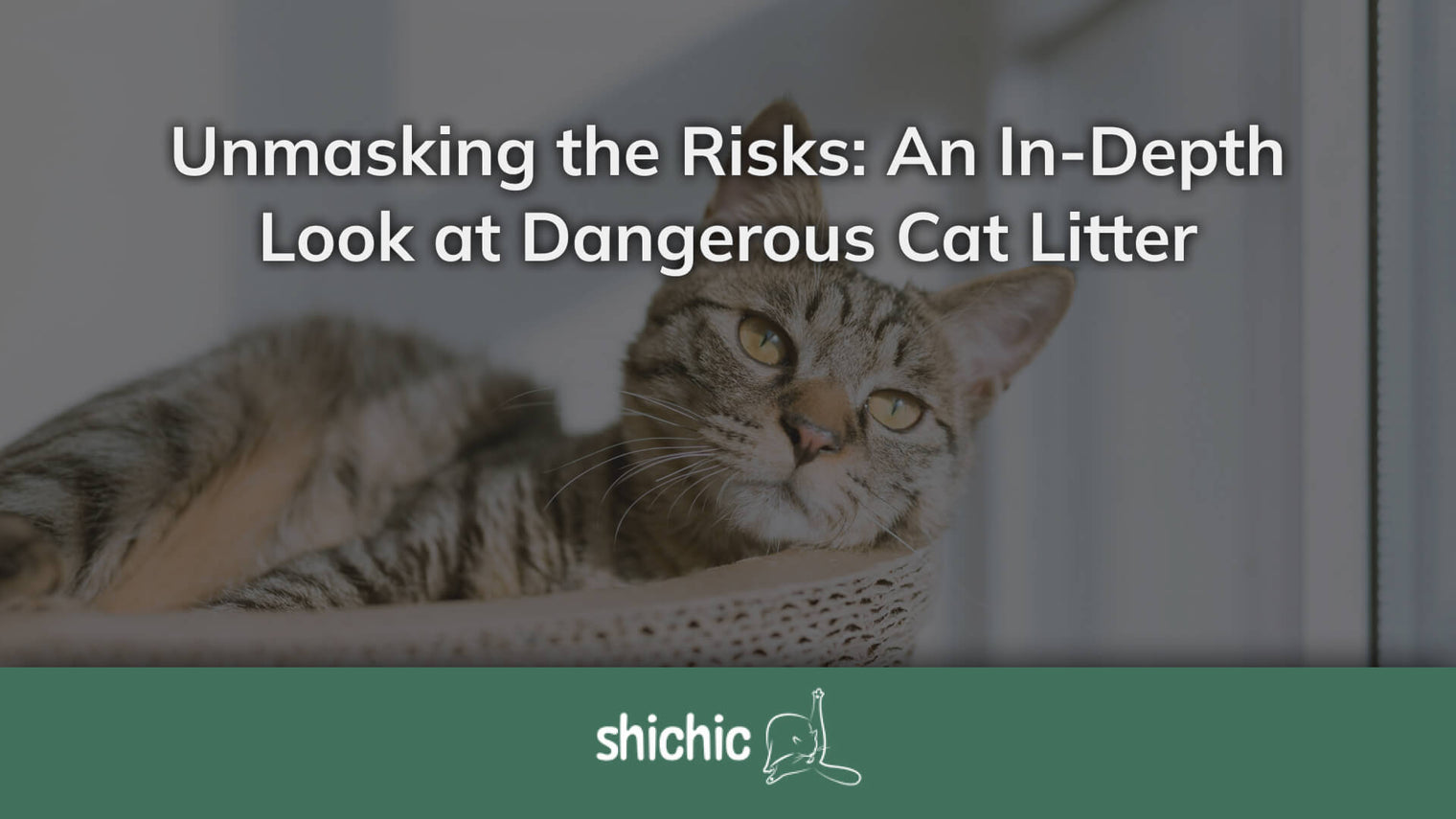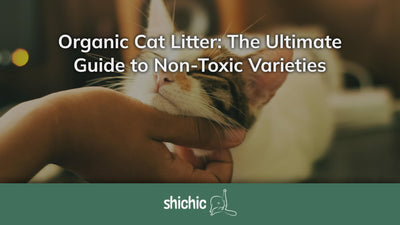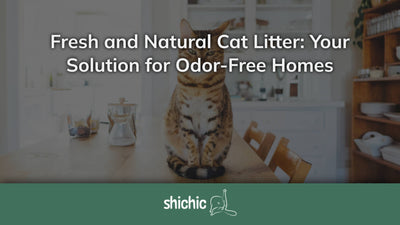Have you ever stopped and thought about the potential risks that could be lurking in your chosen litter? No, we don't mean accidentally stepping on a piece of gravel with bare feet (ouch!). We are talking about the hidden dangers that could be harmful to both you and your beloved kitty.
Welcome readers, to a blog post that is paw-sitively informative! If you are a cat owner, we are sure you can relate to the struggle of finding the perfect litter for your feline friend. It's like trying to find a soulmate on Tinder - there are just so many options and it's hard to know which one will not only keep your cat happy but also won't make your eyes water from the smell.
But have you ever stopped and thought about the potential risks that could be lurking in your chosen litter?
No, we don't mean accidentally stepping on a piece of gravel with bare feet (ouch!). We are talking about the hidden dangers that could be harmful to both you and your beloved kitty. So, grab some snacks and get ready for an eye-opening read as we unmask the risks of dangerous cat litter.
Is Kitty Litter Dangerous?
Oh, the humble kitty litter. It's a necessary evil in the life of every cat lover. It's like that annoying relative who always shows up uninvited, yet you can't imagine your life without them.
But have you ever stopped to consider whether this seemingly innocent substance could actually be hazardous?
Well, buckle up because we are about to re-fur to it as "dangerous cat litter" for a reason.
So...
Can Cat Litter Be Dangerous to Humans?
Well, let's cut to the chase. The answer is... drumroll please... yes! But don't pack up Mittens just yet. The danger doesn't lurk in every litter box. It's specific types of litter and certain circumstances that can pose a risk.
Are Cat Litter Fumes Dangerous?
In a word, potentially. Some litters are dustier than others and can create a fine cloud of particulates when your cat is doing their business or when you're scooping out clumps. This is not exactly the kind of cloud nine you want to be on. Breathing in this dust might irritate your lungs, especially if you have asthma or other respiratory issues.
And then there's the fragrance issue. Many litters are perfumed to mask the, ahem, eau de toilette of your feline friend. However, these fragrances can be problematic for those with allergies or sensitivities to chemicals. So, if your eyes start watering every time you walk past the litter box, it might not just be from the stench!
What cat litter should you stay away from?
Now we're getting to the heart of the matter. If you want to play it safe, you might want to avoid the dangerous cat litters altogether.
The Dangerous Cat Litter Types
Cat owners, beware! Some cat litters are more dangerous than a cactus in a balloon factory. If you're not careful, your fluffy feline could be in for a rough time. Some litters can contain chemicals that are harmful to your cat's health, while others can turn into cement in your kitty's digestive system.
No cat wants that kind of blockage, let alone the vet bills that come with it.
So, if you're choosing a new litter, make sure to read the label and avoid any that sound like a science experiment gone wrong. Your cat will thank you, and you'll get to keep your balloon factory cactus-free.
Let's see the most dangerous cat litter. Starting with the worst one and moving towards the safer options:
Clay Litter (Sodium Bentonite Cat Litter)
Some of you may be unsuspectingly using a dangerous cat litter. Yes, you heard it right - dangerous! If you're using sodium bentonite clay litter, you might want to think twice about it.
This stuff can be seriously harmful to your furry feline friends if ingested.
And let's be real, cats have a tendency to get into just about anything.
But why is sodium bentonite clay litter so dangerous?
What Is Clay Cat Litter (Sodium Bentonite Cat Litter)?
Clay cat litter (specifically sodium bentonite clay litter) is made from a type of highly absorbent clay that forms into clumps when wet. It's a popular choice for many cat owners due to its ability to absorb and mask odors.
Is Clay Cat Litter Considered Dangerous Cat Litter?
Ah, let us tell you about the cat litter that will make your whiskers curl - it's known as sodium bentonite cat litter, known as clay cat litter.
Now, while this litter may be très magnifique for keeping things tidy and smelling fresh, there are some dangers to keep in mind.
You see, this litter can become quite heavy and clumpy when wet, making it difficult to scoop and potentially dangerous for playful felines who may accidentally ingest it.
This means that these clumps can then expand in your cat's stomach and body, leading to serious intestinal blockages or even death.
Why?
According to catorcat, cat clay litter can cause:
- Internal blockage,
- Feline asthma,
- And bacterial infections.
Yikes!
Is clay cat litter safe to breathe?
Well, no! Apart from ingestion dangers, this type of litter can also be harmful to your cat's respiratory system. The dust created when pouring or scooping can irritate their lungs and cause breathing problems.
So, when it comes to choosing a safe and healthy cat litter for your furry friend, make sure to steer clear of sodium bentonite clay litter and opt for a safer alternative. Your cat's health and safety should always come first!
Silica Gel Crystal Cat Litter
We've got a real danger lurking in our midst: silica gel crystal cat litter. That's right, this innocent-looking litter is actually a secret agent for world domination. Just kidding, but seriously, there have been some concerns around this type of litter.
Apparently, if your furry friend decides to snack on it (which, let's face it, cats can be real weirdos sometimes), it could cause some serious health problems.
So, as tempting as it may be to use this sleek and stylish silica gel crystal litter, maybe stick with the traditional stuff. After all, who needs the added stress of potentially poisoning their precious kitty?
But just in case you're still on the fence about it, let's dig a little deeper into the dangers of this seemingly harmless litter.
What Is Silica Gel?
Silica gel might sound like some new hip health trend, but it's actually just tiny balls of desiccant that you find in shoeboxes, beef jerky, and all those little packets a.k.a. "Do Not Eat" that come with every new purchase.
These little guys are basically like little sponges that soak up moisture like the last piece of pizza soaks up grease.
That's why you'll find them in products that are prone to moisture-causing mold or bacteria growth.
But Is Silica Cat Litter Safe?
Let's talk about dangerous cat litter, or more specifically, silica cat litter. You may be thinking, "Silica, that sounds like a fancy crystal." But let us tell you, there's nothing fancy about a litter that could potentially harm your furry friend.
Sure, silica may absorb odors and moisture like a boss, but it also has the potential to cause respiratory and health issues in your cat.
Why?
According to moderncat:
- The inhalation of microscopic silica dust can lead to silicosis in cats.
- Most crystal litter is dyed blue with cobalt chloride , which is known to cause cancer in both cats and humans.
And let's be honest, having a feline with asthma isn't exactly going to be a barrel of laughs. So, is silica cat litter safe? The answer is a resounding "meh, not really."
But don't worry, there are plenty of safe and effective alternatives out there that won't harm your cat's health. Just be sure to do your research and read reviews before switching to a new litter.
Cedar Cat Litter (Wood litter)
Ah, the famous Cedar Cat Litter! A purr-fect solution for all the fancy feline friends out there! Honestly, who wants to use regular boring clay litter when you can have a litter box that smells like a forest?
But beware mes amis, this litter is not for the weak-nerved, it's dangerous cat litter, and I'm not just kitten around!
What Is Cedar Cat Litter (Wood Litter)?
Cedar cat litter, also known as wood litter, is a type of cat litter made from small shavings of cedar wood. These shavings are usually treated to enhance their absorption capabilities and help control odor.
Is Cedar Cat Litter Considered Dangerous Cat Litter for Cats?
Yes, my fellow feline enthusiasts, cedar cat litter is considered dangerous for cats!
Dangerous?
How so?
Well, as it turns out, the aromatic cedar can be overpowering for sensitive kitty noses, and the little wood shavings can create quite a mess, if not contained properly.
While not all cedar trees are toxic to cats, some specific types can be harmful.
According to catster, these include:
- White Cedar (Melia azedarach): Also known as bead tree, chinaberry tree, paradise tree, or Persian lilac, white cedar is highly toxic to cats. It contains a chemical compound called tetranortriterpenes (meliatoxins), which can lead to symptoms like drooling, vomiting, diarrhea, and seizures if ingested. The berries, leaves, flowers, and bark of white cedar are all toxic.
- Eastern Red Cedar (Juniperus virginiana): This false cedar tree has poisonous bark, berries, and needles.
- Western Red Cedar (Thuja plicata): Although less dangerous than the Eastern red cedar, it can still cause adverse effects in cats due to the presence of phenols and terpenes
While certain cedar trees might only lead to minor negative reactions such as digestive discomfort, it remains prudent to prevent your cat from interacting with cedars for their safety.
So, should I completely avoid using cedar cat litter?
Not necessarily! While it may not be the best option for all cats, some owners swear by cedar cat litter and have had no issues with their feline friends using it.
So if you're feeling brave, give this litter a try and let your cat enjoy the sweet smell of nature (just make sure to vacuum up after). Bonne chance!
Recycled Paper Cat Litter
Now, let's talk about an eco-friendly option for cat litter - recycled paper cat litter. This type of litter is made from recycled newspaper or other paper products, and it's a great alternative for those looking to reduce their environmental footprint.
How Does Recycled Paper Cat Litter Work?
Recycled paper cat litter works by absorbing liquid waste and trapping solid waste in clumps. This makes it easy to scoop and dispose of, just like traditional clay litter. Plus, it's biodegradable and can be safely flushed down the toilet or composted.
Is Recycled Paper Litter Considered a Dangerous Cat Litter?
Well, while you might not think of paper as a dangerous material, it's important to be aware of the potential dangers that recycled paper cat litter can pose.
One concern is the possibility of mold growth in damp or humid environments. The moisture from your cat's waste can create an environment for mold to thrive, which can be harmful to both you and your cat's health.
Morover, according to TOFU Cat Litter Australia, sodium bentonite might be added to recycled paper cat litter. So, just like clay litter, paper litter could be considered a health hazard to people and kitties.
Additionally, some recycled paper cat litter may contain added fragrances or chemicals that can irritate your cat's respiratory system. It's important to read the ingredients list and avoid any potential irritants for your cat.
Pine Litter (Wood litter)
Ah, pine litter, how chic! It's like the little black dress of cat litter, non? But attention, mes amis, this is not your ordinary litter. Oh no, this can be a dangerous cat litter, and not in a good way.
What Is Pine Cat Litter?
Let's talk about pine cat litter. Think of it as a fancy way of letting your cat poop and pee in the woods, without having to actually take them camping.
Is Pine Cat Litter a Dangerous Cat Litter Type?
Well, let us tell you, if you're thinking of using pine cat litter, you might as well just dress up as a tasty squirrel and let your feline friend have at you.
Just kidding (sort of).
But in all seriousness, some cat owners are worried that pine cat litter could be dangerous for their furry friends.
The main concern with pine cat litter is the potential for dust particles. As Tuft and Paw mentions, some pine pellets can become dusty.
And dust can lead to respiratory issues, especially if your cat has asthma or other respiratory conditions.
Additionally, according to Mr Boss Cat, pine litter can contain phenols, which are naturally occurring chemicals found in wood. These chemicals can be toxic if ingested in large quantities.
As you see, there are some concerns about the toxicity of pine when it is not properly handled.
However, this is not the case with most pine cat litter in the market. During the manufacturing process, the pine oils are destroyed, leaving the pellets safe for use and most pine cat litter, such as FlushIt, are dust free.
In any case, whatever type of cat litter you choose to use, it is best to always check the ingredients and production process before making a decision.
The safety of your pet should always be the top priority!
What Cat Litter Do Vets Recommend?
Veterinarians may recommend different cat litters based on various factors, including the health and preferences of individual cats. There isn't a one-size-fits-all recommendation, as cats can have unique needs and sensitivities. However, as Preventive Vet indicates, veterinarians, cats and cat owners often consider certain characteristics when suggesting cat litters. Here are some factors that vets may take into account:
Dust Free Formulas: Many veterinarians recommend cat litters with low dust formulations to minimize respiratory irritation in both cats and their human caregivers.
Clumping Ability: Clumping litters are often preferred for their ease of scooping and maintenance. They help control odors and make it simpler to keep the litter box clean.
Odor Control: Cat litters with effective odor control are generally favored by veterinarians to ensure a clean and pleasant environment for both cats and their owners.
Non-Toxic and Safe Materials: Veterinarians may recommend litters made from non-toxic and safe materials to prevent any adverse health effects if the cat ingests the litter accidentally.
Biodegradability: Some vets may suggest environmentally friendly and biodegradable cat litters as a more sustainable option.
So, while veterinarians may not have one specific brand to recommend, they often consider these factors and litter safety when suggesting a cat litter that would be suitable for your feline companion.
What Is the Best Cat Litter?
The best cat litter is ultimately subjective and will depend on the individual needs and preferences of your cat. However, there is a rising trend towards more natural and eco-friendly options for cat litter.
Some popular choices include tofu cat litter, wheat litter, and corn litter. These options are not only biodegradable, but they also tend to be low dust and gentle on a cat's paws.
What you will put in your cat's litter box will depend on their individual needs and your personal preferences. But, if you want to delve into more natural and sustainable options, Shichic is here to offer you the best cat litter.
Shichic Flushit! Tofu Cat Litter is made from 100% natural ingredients, such as soy beans and rose petals, making it non-toxic and safe for cats.
It also has excellent odor control and clumping abilities for easy scooping and cleaning. Plus, it's biodegradable, making it an eco-friendly choice for conscientious cat owners.
These make it a top choice amongst environmentally conscious cat owners who want to provide their furry friends with a non dangerous cat litter.
So, if you're looking for a natural and safe cat litter option, give Shichic Flushit a try!



